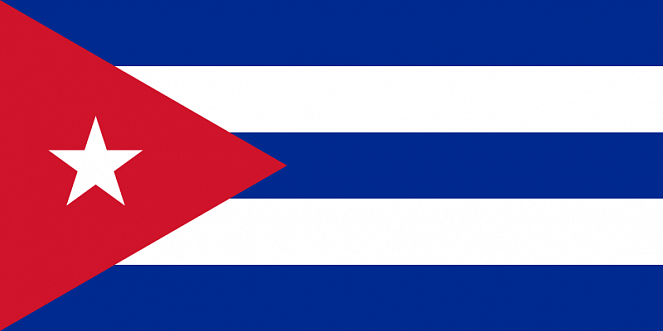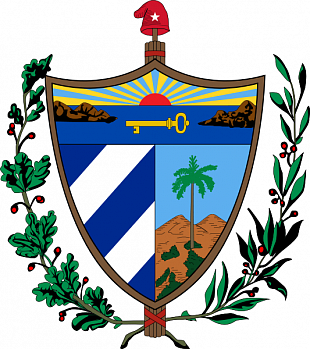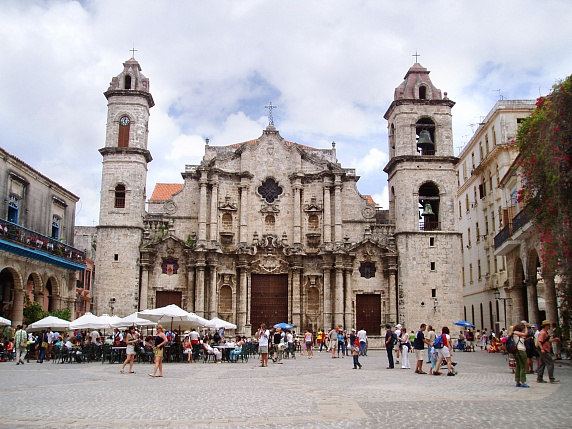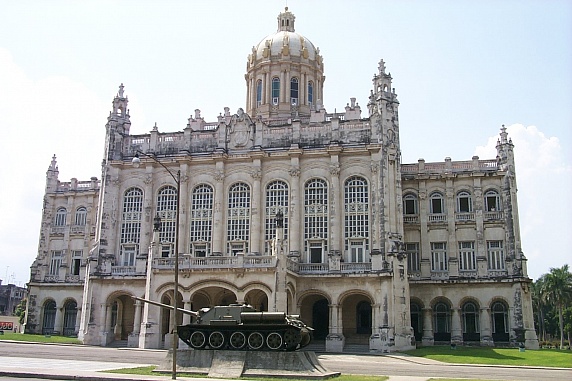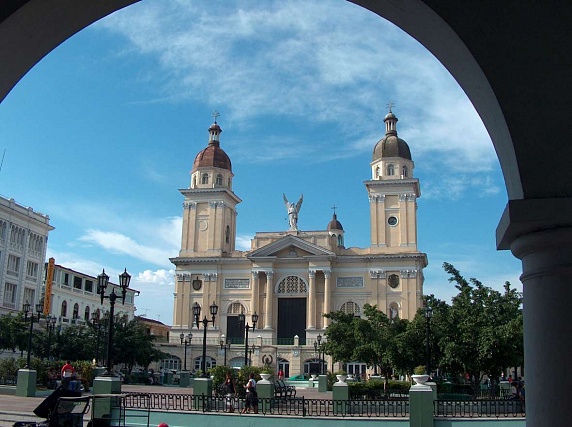 la República de Cuba
la República de Cuba
Russian Minister of Foreign Affairs Sergey Lavrov Interview with RIA Novosti on Russian Relations with the Countries of Latin America and the Caribbean Basin
Question: What is the reason behind the currently observable noticeable reinvigoration of Russian ties with the countries of Latin America and the Caribbean basin?
Foreign Minister Lavrov: Relations between Russia and the countries of Latin America and the Caribbean Basin have indeed acquired strong positive dynamics in the last several years. The chief reason for that is the objective coincidence of interests. The reinvigoration of political, trade-and-economic, scientific and humanitarian-cultural cooperation with the LACB countries is among the Russian foreign policy priorities. The Foreign Policy Concept of the Russian Federation, approved by President Dmitry Medvedev, orients us toward this.
Russia and the Latin American states are natural allies in the creation of a new, safer and fairer world order and in tackling the key problems of today on the basis of a shared commitment to the fundamental norms and principles of international law, to the reinforcement of the multilateral mechanisms governing international relations and to the enhancement of the central UN role in world affairs. We are brought closer together by our rejection of attempts at imposing unilateral approaches, by our readiness in deeds, not in words, to respect the interests of partners, to strictly observe the principle of noninterference in the internal affairs of sovereign states and by our choice in favor of a collective negotiated settlement to crises and conflicts.
In August this year, during the events surrounding South Ossetia, many Latin American countries straightforwardly condemned the Georgian aggression and the US policy in the Caucasus and backed up the actions of Russia to force Tbilisi to peace. Nicaragua has officially recognized Abkhazia and South Ossetia as independent states.
Russian-Latin American trade and economic cooperation is rapidly developing – at an annual growth rate of 25-30 percent. This year we expect a record level of trade: about 15 billion dollars. We focus on the further deepening of trade and economic ties, including investment cooperation. We intend to lay emphasis on increasing the Russian export of high technologies and on strengthening our production collaboration in energy, oil and gas production and transportation, machine-building, the metallurgical industry, the transport sector, the peaceful utilization of nuclear energy and space exploration.
The best traditions of Russian-Latin American cooperation in the humanitarian-cultural sphere are gradually being revived, of which the recent holding in seven countries – Cuba, Costa Rica, Venezuela, Brazil, Argentina, Chile and Paraguay – of the Days of Russia, including cinema weeks, photographic exhibitions and concerts by the Sretensky Monastery Choir, is striking evidence.
The building-up of mutually advantageous ties with the Latin American countries rests on a constantly-renewed juridical base. More than 150 joint documents have been signed over the last decade, encompassing the most diverse fields – from outer space to sport exchanges.
Question: What is your vision of Latin America in the contemporary world?
Foreign Minister Lavrov: It is obvious that Latin America is swiftly integrating itself into global politics and economics and is objectively becoming one of the centers of economic growth and political clout, confidently upholding its independent role in world affairs. We believe this makes for the sustainability of an emerging multipolar world system.
Latin America today is a totality of countries diverse in their significance and potential. There are among them such giants as Brazil, Mexico and Argentina, exerting serious influence on international processes, and small island states. This is a major component of the cultural and civilizational diversity of the contemporary world. Each of these states is unique and distinctive, has its own voice in the world arena, and, consequently, is our full-fledged partner.
The region consists of 33 states with a total population of about 550 million, with a weighty production, economic and intellectual potential, with a capacious and dynamically expanding market and with a well-developed banking system. The total GDP of LACB is 3 trillion dollars, or 2.5 times that of the ASEAN countries.
Brazil and Mexico actively participate in the Heiligendamm Process, aimed at deepening the dialogue between the G8 and the five major developing countries. And Brazil, in addition, actively participates in dialogue in the format of BRIC, which also incorporates Russia, India and China, the world's most dynamically developing economies.
For Russia, Latin America is a natural constructive partner. Besides, the coming to power of new leaders in a number of countries of the continent, and their striving to reinforce an independent course in foreign policy and to create a socially oriented market economy create additional possibilities for the development of our relations and make it possible to tap the cooperation potential more fully and to activate more effectively new formats of joint application of efforts on the basis of coinciding interests.
Question: You are talking about the coincidence of the positions of Russia and most Latin American countries on key foreign policy issues, about the possibilities to build up trade and economic collaboration and about the potential for bilateral cooperation in other spheres. Yet an opinion exists that our rapprochement with Latin American states is built primarily around diplomatic rivalry with the United States. Is that so?
Foreign Minister Lavrov: This is absolutely wrong. In the 21st century the world is rapidly changing. New stimulus are taking shape for the behavior of states on a de-ideologized basis.
Today in this region, as in the world generally, bloc thinking is receding into the past. By the way, none of the Latin Americans dispute democracy and market economy as the fundamental principles of political arrangement and economic life for society. But we're also witnessing a diversity of forms of their practical realization in different countries. The region is in search of its own ways for the strengthening of democracy and internal political stability and for sustainable economic growth.
This sovereign choice is the exclusive competence of the peoples and governments of the respective countries. As to Russia, we are ready to develop mutually advantageous and equal cooperation with all countries of the region regardless of any ideological motives whatsoever. The program of the upcoming trip of President Medvedev to Latin America speaks of this, for example. He is scheduled to attend the Asia-Pacific Economic Cooperation forum in Lima and to pay official visits to Peru, Brazil, Venezuela and perhaps to other countries as well. A number of bilateral meetings of the President with leaders of Latin American states will take place on the sidelines of the APEC events. In addition, the first official visits by a Russian Minister of Foreign Affairs to Colombia and Ecuador will be made. Leaders of Argentina, Cuba, Nicaragua and Uruguay will visit Moscow at the end of this year – the beginning of next.
I am convinced that Russian-Latin American relations have a great future. Our cooperation is not directed against any third countries and is not subject to political conjuncture.
Question: What role does Russian cooperation with the LACB countries play in the military-technical field?
Foreign Minister Lavrov: I would not single out the military-technical sphere from the general context of Russian-Latin American interaction. It is known that Russian-made military equipment enjoys well-deserved prestige and, consequently, demand in world markets.
Russia treats with understanding the desire of many Latin American countries to diversify the sources of equipment they buy as part of the modernization of their armed forces. We maintain our military-technical cooperation transparently and strictly observe all the international obligations assumed. As is known, there are no UN Security Council arms purchase restrictions or sanctions imposed on any of the Latin American countries. Military equipment we supply does not belong to the category of offensive types of weaponry. In terms of technical parameters, it is entirely defensive weapons.
Question: What about our cooperation with Latin American integration associations?
Foreign Minister Lavrov: I have already said that Latin America is in search of its own recipes and models of economic and social development. This also applies to the new forms of integration building that most adequately correspond to the requirements of our time. Various-speed and various-level integration processes are under way in the region, and the complementarity of the economies of the countries participating in them is growing stronger. I think this is a positive tendency. While retaining a preeminently economic character, such entities as the South American Common Market, the Bolivarian Alternative for the Peoples of America, the Andean and Caribbean Communities and the Central Integration System are gradually gaining strength, becoming mechanisms for political coordination.
The fusion and mutual enrichment of different integration structures is characteristic of the region today. A consequence of the consolidation of unifying tendencies in South America was the recent creation of a Union of South American Nations. We seek to develop constructive relations with all Latin American associations. In the political domain we cooperate with the Rio Group and also with the Organization of American States and with the Latin American Integration System, where Russia has observer status.
Question: How are ties with compatriots in Latin American states developing?
Foreign Minister Lavrov: Russian communities – about 200-250 thousand expatriates from Russia and the former USSR live in Latin America in all – exist practically in each country. Many of them arose as recently as the last decade and incorporate our teachers and specialists acquainting their students with the achievements in Russian science and technology. Our compatriots actively participate in the activities of friendship associations and societies and of centers for the study of the Russian language and culture and help in organizing exhibitions and guest performances by our artistic collectives.
The Foreign Ministry and Russian diplomatic missions in the countries of the region give priority attention to the deepening of interaction with compatriots, and comprehensively help the consolidation of the diaspora and its organizations and the expansion of the presence of the Russian Orthodox Church. Care for the preservation and strengthening of the Russian-language space abroad is one of the foreign policy priorities of the Russian leadership. We will continue to work for the fullest possible unfolding of the rich creative potential of the Russian World uniting us.
November 17, 2008
